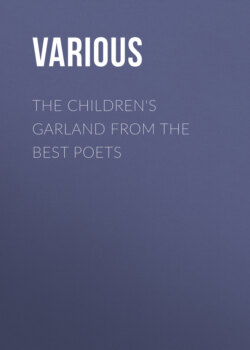Читать книгу The Children's Garland from the Best Poets - Various - Страница 21
На сайте Литреса книга снята с продажи.
THE FERRYMAN, VENUS, AND CUPID
ОглавлениеTable of Contents
As I a fare had lately past,
And thought that side to ply,
I heard one, as it were, in haste,
A boat! a boat! to cry;
Which as I was about to bring,
And came to view my fraught,
Thought I, what more than heavenly thing
Hath fortune hither brought?
She, seeing mine eyes still on her were,
Soon, smilingly, quoth she,
Sirrah, look to your rudder there,
Why look'st thou thus at me?
And nimbly stepp'd into my boat
With her a little lad,
Naked and blind, yet did I note
That bow and shafts he had,
And two wings to his shoulders fixt,
Which stood like little sails,
With far more various colours mixt
Than be your peacocks' tails!
I seeing this little dapper elf
Such arms as these to bear,
Quoth I, thus softly to myself,
What strange things have we here?
I never saw the like, thought I,
'Tis more than strange to me,
To have a child have wings to fly,
And yet want eyes to see.
Sure this is some devised toy,
Or it transform'd hath been,
For such a thing, half bird, half boy,
I think was never seen.
And in my boat I turn'd about,
And wistly view'd the lad,
And clearly I saw his eyes were out,
Though bow and shafts he had.
As wistly she did me behold,
How lik'st thou him? quoth she.
Why, well, quoth I, the better should,
Had he but eyes to see.
How sayst thou, honest friend, quoth she,
Wilt thou a 'prentice take?
I think, in time, though blind he be,
A ferryman he'll make.
To guide my passage-boat, quoth I,
His fine hands were not made;
He hath been bred too wantonly
To undertake my trade.
Why, help him to a master, then,
Quoth she, such youths be scant;
It cannot be but there be men
That such a boy do want.
Quoth I, when you your best have done,
No better way you'll find,
Than to a harper bind your son,
Since most of them are blind.
The lovely mother and the boy
Laugh'd heartily thereat,
As at some nimble jest or toy,
To hear my homely chat.
Quoth I, I pray you let me know,
Came he thus first to light,
Or by some sickness, hurt, or blow,
Deprived of his sight?
Nay, sure, quoth she, he thus was born.
'Tis strange, born blind! quoth I;
I fear you put this as a scorn
On my simplicity.
Quoth she, thus blind I did him bear.
Quoth I, if't be no lie,
Then he's the first blind man, I'll swear,
E'er practis'd archery.
A man! quoth she, nay, there you miss,
He's still a boy as now,
Nor to be elder than he is
The gods will him allow.
To be no elder than he is!
Then sure he is some sprite,
I straight reply'd. Again at this
The goddess laugh'd outright.
It is a mystery to me,
An archer, and yet blind!
Quoth I again, how can it be,
That he his mark should find?
The gods, quoth she, whose will it was
That he should want his sight,
That he in something should surpass,
To recompense their spite,
Gave him this gift, though at his game
He still shot in the dark,
That he should have so certain aim,
As not to miss his mark.
By this time we were come ashore,
When me my fare she paid,
But not a word she utter'd more,
Nor had I her bewray'd.
Of Venus nor of Cupid I
Before did never hear,
But that a fisher coming by
Then told me who they were.
M. Drayton
